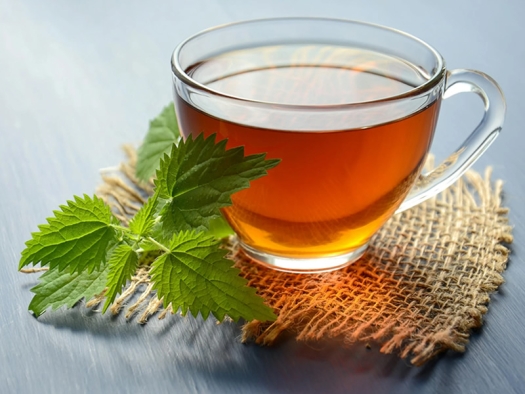GreenTeaGlassCup.jpg

Photo by Mareefe / Pexels
Signs your gut is calling for help
It’s a common misconception that the only signs of poor gut health are digestive problems, like gas, bloating, heartburn, constipation, or diarrhea.
Problems in the gut can also cause or aggravate:
- Food Sensitivities
- Skin Irritations
- Food Cravings
- Mood Changes
- Brain Fog
While there can also be other factors contributing to these issues, it’s worth considering the domino effect that gut health has on nearly everything else in the body.
Benefits of healing your gut
Investigating your gut health is the first place to start because research has shown that it’s linked to hormonal balance, immune function, inflammation, mental health, and more!
Benefits of better gut health include:
- Less Bloating
- Easier Bowel Movements
- Reduced Food Cravings
- Clearer Skin
- Mental Clarity
- More Energy
While every person is unique and on their own healing path, optimizing gut health can have a powerful effect on many of the most common health issues.
Root causes of bloating
First, let’s be clear. Bloating is NOT normal when it is painful, extreme, or happens every day, If you’ve tried the usual things (like eating slowly, chewing thoroughly, drinking beverages at room temperature, and walking after meals) but STILL can’t seem to find a solution for bloating…
It’s time to look deeper for a cause.
Some of the potential issues underneath could be:
- Parasites
- Low stomach acid
- Gut motility issues
- H.pylori overgrowth
- Low digestive enzymes
- Dysbiosis (disrupted gut microbiome)
- Small intestinal bacterial overgrowth (SIBO)
- Small intestinal fungal overgrowth (SIFO)
- Leaky gut (increased permeability)
This is not an exhaustive list! These are only the issues that are specific to the gut, but bloating can also be caused by hormones, stress, or alcohol consumption.
The only way to solve a problem is to first find out what the problem actually is. This is something naturopathic & functional medicine excels at.
How gut health affects metabolism
Pause the scroll and take a minute with me here if you are trying to get answers to what you feel like is a broken metabolism! While a lot of factors play into metabolic health, research shows that one important factor is GUT health.
Here’s how:
- Energy Absorption: Gut microbes produce short-chain fatty acids (SFCAs), which are generally beneficial but when produced in excess can provide extra energy (like calories) absorbed from the gut.
- Appetite: Gut microbes regulate gut hormone levels, like peptide YY and GLP-1, which communicate with the brain and affect appetite and fullness.
- Fat Storage: Some gut microbes increase the absorption of glucose (sugar) from the intestines and promote fat deposition in the liver.
- Inflammation: Chronic inflammation is a hallmark of metabolic dysfunction and can be driven by inflammation in the gut.
You don’t actually have to know all of this to heal. Point is – when we heal the gut, it makes it easier to heal the metabolism, too.
How gut health affects hormone balance
Are you playing the hormone balancing act? Read this.
Your hormones need nutrients for optimal function, and those nutrients need to be properly absorbed from the gut. Not only that, but gut health affects hormone balance in another important way.
The other link between gut health and hormones is specific to estrogen. When things are working right, estrogen binds to proteins in the liver and then moves to the gut for elimination.
But there’s a sneaky enzyme in the intestines that can break up this union between estrogen and the protein, allowing estrogen to be absorbed right back into the body again.
Ever heard of estrogen dominance? It’s the driving force of many hormonal conditions and can be rooted in gut health!
How gut health affects the skin
The gut-skin axis explains the direct connection between gut health and skin health. This happens through:
- Gut Microbiome: Changes in the gut microbiome have been linked to many skin conditions, including acne, eczema, rosacea, and psoriasis.
- Food Sensitivities: Gluten and other food sensitivities have been linked to eczema and other skin rashes because of their effect on gut inflammation and immune function.
- Inflammation: When inflammation occurs in the gut, it can lead to increased intestinal permeability (leaky gut) and trigger inflammation elsewhere in the body, including the skin.
The usual way of addressing skin issues is through external topical applications, but to address the root cause, we like to look at the gut.
Holistic Health Tips
Gut health habits
Want better digestion, skin health, energy, and mood? It’s time to heal the gut.
While some people can benefit from targeted assessments and longer-term protocols to heal the gut, just about everyone can benefit from simple everyday gut-loving micro-habits.
Like:
- Stay hydrated. Your digestive juices depend on it!
- Eat the rainbow. Colorful fruits and veggies have antioxidant and anti-inflammatory properties plus a dose of fiber for a happy gut.
- Try ground flax, chia, or hemp seeds. These provide some fiber and are high in omega-3 fatty acids for a healthy inflammatory response.
- Boost magnesium (particularly if you tend toward constipation).
- Keep moving. Exercise enhances the diversity of the gut microbiome.
And if you’ve tried these things but need deeper support to figure out what is really going on, you can contact a functional medicine doctor for guidance (see The Institute for Functional Medicine).
Tips to reduce digestive bloating
Following are tips for bloating, but first, remember that bloating can happen for many different reasons – from stress to hormones, food sensitivities, dysbiosis, or SIBO. If you experience painful, extreme, or everyday bloating, the best approach is to be evaluated and follow a personalized plan based on YOU.
With that being said, here are some helpful tips to reduce the bloat:
- Minimize trigger foods (common triggers are sugar, alcohol, carbonated drinks, artificial sweeteners, cruciferous vegetables, and beans).
- Stay hydrated and gradually increase fiber to ensure regular bowel movements (constipation can cause bloating, but so can too much fiber too fast).
- Consider probiotics or probiotic-rich foods (this is not appropriate for everyone because it can make things worse for anyone who already has overgrowth of bacteria).
- Take a walk (movement can encourage healthy digestion).
- Slow down (stress or eating on the run puts your nervous system alert, whereas calming your nervous system promotes healthy digestion).
Probiotics vs. Prebiotics
Which will it be?
If you’re trying to incorporate gut-healthy habits but are confused about probiotics and prebiotics, here’s the scoop. Probiotics are live microorganisms that are meant to help maintain the beneficial bacteria in the gut microbiome. Prebiotics are dietary fibers that act as food for those beneficial bacteria.
Both can come in the form of either foods or supplements.
Probiotic supplements deliver microorganisms like Acidophilus of Bifidobacteria, whereas prebiotic supplements deliver fibers like inulin, arabinogalactan, or fructooligosaccharides.
Please be aware that even though probiotics and prebiotics are generally considered safe for healthy people, they are not for everyone and can aggravate gut problems in people with certain conditions (like SIBO).
But if you’re looking to gently boost your intake of foods that support the diversity of your gut microbiome, here are some to consider.
Probiotic-Rich Foods
- Yogurt
- Kefer
- Kombucha
- Sauerkraut
- Kimchi
- Natto
Prebiotic-Rich Foods
- Bananas
- Artichoke
- Asparagus
- Onions
- Flaxseeds
- Oats
Polyphenols for the gut
What are polyphenols anyway? Polyphenols are plant compounds that have antioxidant properties and help to combat inflammation, which is often linked with poor gut health.
Research shows that polyphenols also promote a healthy balance of bacteria in the gut microbiome. Here are some specific foods that have been studied and shown to benefit the gut:
- Pomegranate extract
- Blackberry extract
- Tart cherry juice
- Red wine
- Green tea
- Cocoa
- Natto and tofu
Each of these provide unique polyphenols, like anthocyanins, catechins, or genistein.
Alongside a healthy diet, there are so many other things we can do with naturopathic and functional medicine to heal the gut.
Three beverages for gut health
Looking for something different to drink that will support a healthy gut?
- Golden Milk: Golden milk gets its color from turmeric. It’s made by warming 2 cups of a milk of your choice on the stove with 1 tsp of turmeric powder and any other spices or sweeteners to taste (cinnamon, ginger, cardamon, black pepper, vanilla, maple syrup, etc.) Turmeric has antioxidant and anti-inflammatory properties to benefit the gut!
- Kombucha: Kombucha is a fizzy fermented tea that can be purchased at the store or made at home (you’ll need a SCOBY for the fermentation process). It’s rich in B vitamins as well as probiotic bacteria to support the gut microbiome.
- Green Tea: Green tea is rich in catechins, which are antioxidant polyphenols that have been shown to promote a healthy gut microbiome.
Three exercises for better digestion
Ready for better gut health? It’s easy to get focused on food and nutrition, but don’t forget movement! Here are 3 exercises that are backed by research to support digestion.
- Walking: Walking helps to stimulate the digestive tract so you experience better bowel movements and less gas and bloating. Plus, research shows that physical activity supports a healthy gut microbiome!
- Yoga: Yoga puts the nervous system into the parasympathetic “rest and digest” mode, while also directly stimulating digestion through certain poses (like downward dog or triangle pose). Research has shown that yoga improves quality of life in people with functional digestive problems.
- Crunches: Crunches, sit-ups, and other exercises that strengthen the abdominal muscles can help to ease gas and bloating – just do them on an empty stomach!
References
Liu BN, Liu XT, Liang ZH, Wang JH. Gut microbiota in obesity. World J Gastroenterol. 2021;27(25):3837-3850.
He S, Li H, Yu Z, et al. The Gut Microbiome and Sex Hormone-Related Diseases. Front Microbiol. 2021;12:711137. Published 2021 Sep 28.
Hu S, Ding Q, Zhang W, Kang M, Ma J, Zhao L. Gut microbial beta-glucuronidase: a vital regulator in female estrogen metabolism. Gut Microbes. 2023;15(1):2236749.
De Pessemier B, Grine L, Debaere M, Maes A, Paetzold B, Callewaert C. Gut-Skin Axis: Current Knowledge of the Interrelationship between Microbial Dysbiosis and Skin Conditions. Microorganisms. 2021;9(2):353. Published 2021 Feb 11.
Yang Q, Liang Q, Balakrishnan B, Belobrajdic DP, Feng QJ, Zhang W. Role of Dietary Nutrients in the Modulation of Gut Microbiota: A Narrative Review. Nutrients. 2020;12(2):381. Published 2020 Jan 31.
Ramos C, Gibson GR, Walton GE, Magistro D, Kinnear W, Hunter K. Systematic Review of the Effects of Exercise and Physical Activity on the Gut Microbiome of Older Adults. Nutrients. 2022;14(3):674. Published 2022 Feb 5.
Song BK, Han D, Brellenthin AG, Kim YS. Effects of core strengthening exercise on colon transit time in young adult women. J Exerc Sci Fit. 2021;19(3):158-165.
Wilke E, Reindl W, Thomann PA, Ebert MP, Wuestenberg T, Thomann AK. Effects of yoga in inflammatory bowel diseases and on frequent IBD-associated extraintestinal symptoms like fatigue and depression. Complement Ther Clin Pract. 2021;45:101465.
Revised by Joanne Quinn, PhD; content provided by Wellnesswriter.com.


